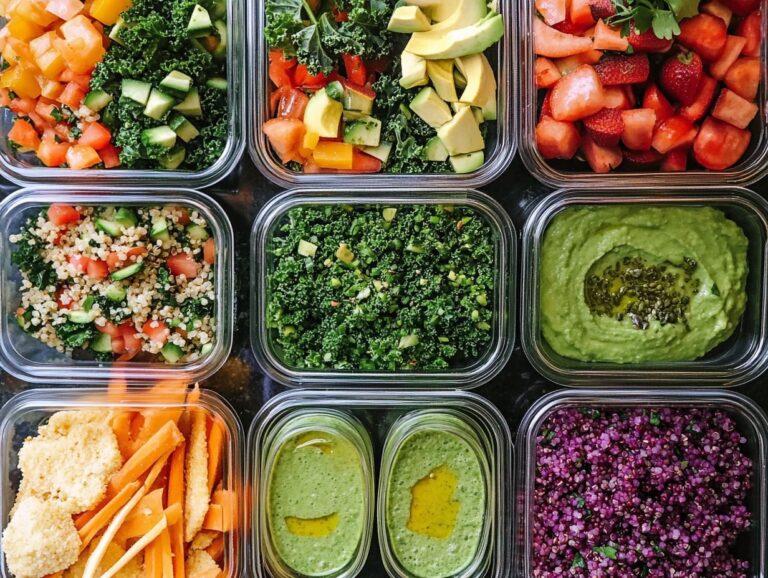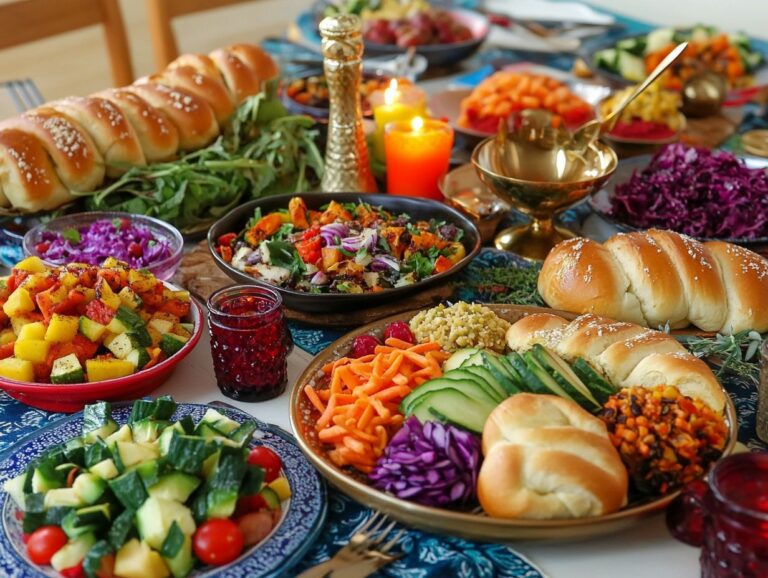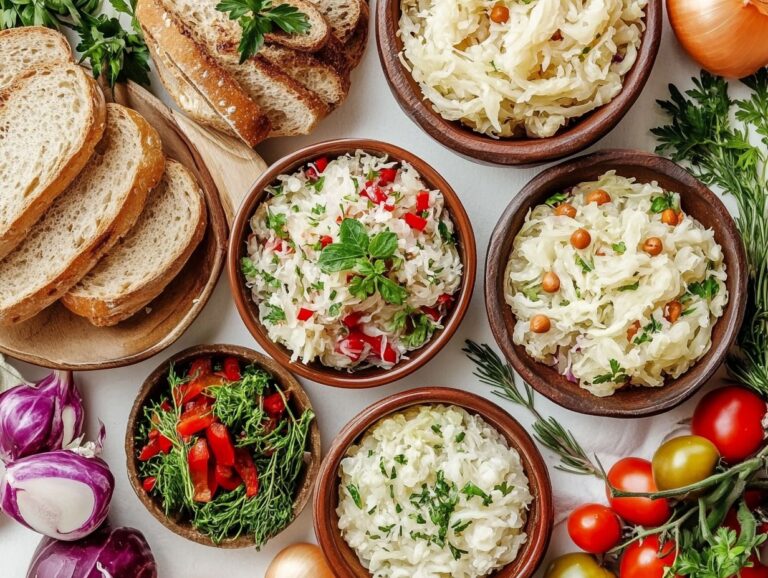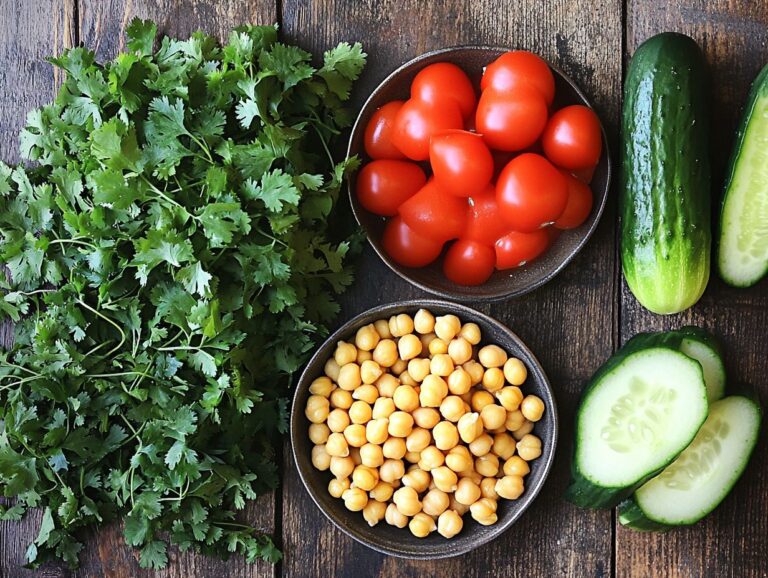Caribbean cuisine is celebrated for its vibrant flavors and rich cultural influences, traditionally encompassing a wide variety of meats, seafood, and an increasing number of vegan options. However, there is a growing trend toward adopting a vegan diet that retains the essence of Caribbean cooking while promoting health and environmental sustainability. This feature explores the benefits of a vegan Caribbean diet and highlights key ingredients and spices, like turmeric and cumin, that are integral to this culinary tradition. It includes mouthwatering recipes such as jerk tofu skewers and coconut rice, as well as suggestions for infusing bold, spicy flavors into meals like coconut curry and Jamaican mango stew. Whether you are vegan or simply seeking a delicious twist on Caribbean classics, there is something for everyone to enjoy.
Overview of Traditional Caribbean Cuisine
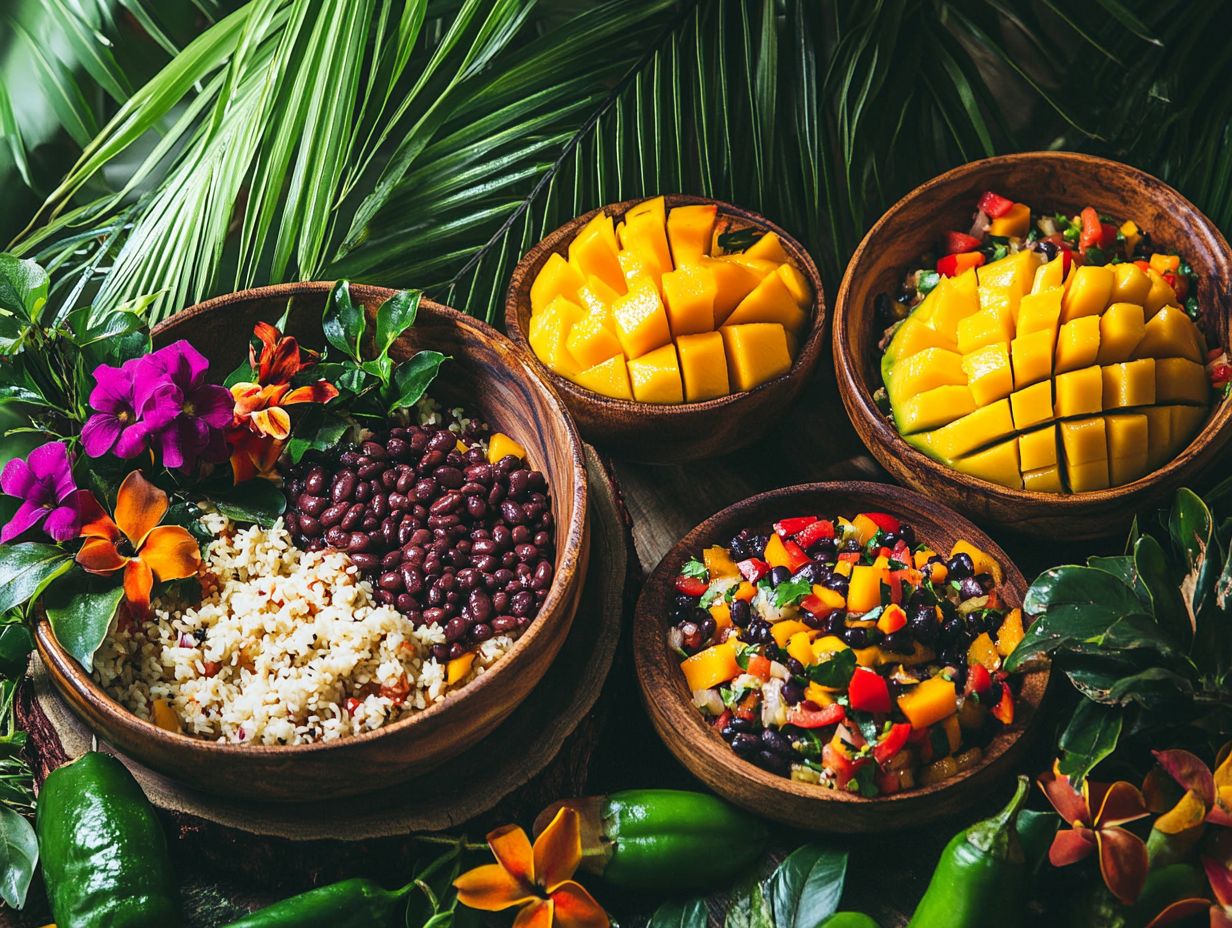 Caribbean cuisine is a vibrant and diverse culinary tradition that reflects the cultural influences of Africa, Europe, and indigenous peoples. Caribbean comfort food is not only satisfying and flavorful but also features fresh ingredients such as chickpeas, coconut rice, roasted plantains, and Trinidadian green beans. A variety of spices and herbs, including thyme, cumin, turmeric, and paprika, are used to create dishes that are rich in taste and steeped in history. Each island boasts its own unique flavors and recipes. Jamaican and Trinidadian comfort foods serve as prime examples, incorporating blends of ingredients such as sweet potatoes, kidney beans, coconut milk, and spicy peppers that elevate the dining experience to new heights.
Caribbean cuisine is a vibrant and diverse culinary tradition that reflects the cultural influences of Africa, Europe, and indigenous peoples. Caribbean comfort food is not only satisfying and flavorful but also features fresh ingredients such as chickpeas, coconut rice, roasted plantains, and Trinidadian green beans. A variety of spices and herbs, including thyme, cumin, turmeric, and paprika, are used to create dishes that are rich in taste and steeped in history. Each island boasts its own unique flavors and recipes. Jamaican and Trinidadian comfort foods serve as prime examples, incorporating blends of ingredients such as sweet potatoes, kidney beans, coconut milk, and spicy peppers that elevate the dining experience to new heights.
Benefits of a Vegan Caribbean Diet
The health and environmental benefits of a vegan Caribbean diet make it an excellent choice for delicious and nutritious meals. Plant-based ingredients such as chickpeas, sweet potatoes, and a variety of spices, including curry powder, can be used to create satisfying comfort foods that promote well-being while also reducing the carbon footprint. Herbs, spices, and lime juice enhance the flavor of plant-based dishes, and carbohydrates like coconut rice, roasted plantains, and vegan adaptations of traditional Caribbean recipes contribute texture, flavor, and satiety.
Health and Environmental Benefits
The health benefits of a vegan Caribbean diet, featuring a variety of ingredients like kidney beans and black eyed peas, include improved heart health, effective weight management, and enhanced digestion. This type of diet is low in saturated fat and cholesterol, which helps reduce the risk of high blood pressure and heart disease. Additionally, consuming fiber-rich foods such as chickpeas, Trinidadian green beans, sweet potatoes, and black eyed peas promotes a feeling of fullness and supports weight loss without sacrificing enjoyment in eating. Moreover, the environmental impact of a vegan diet is significant for sustainability, as it helps to lower the carbon footprint associated with animal agriculture by encouraging the consumption of vegetables like Jamaican mangoes, fresh herbs, and green beans. The advantages of a vegan Caribbean diet can also be observed in various recipes and meals that highlight how nutritious plant-based ingredients can be prepared in flavorful and satisfying ways. These meals provide essential vitamins and minerals while also reducing the risk of chronic diseases, making them a simple yet effective choice for a healthy lifestyle. For example, a diet rich in whole grains, legumes, fresh fruits like lime, and vegetables is linked to lower rates of obesity, diabetes, and heart disease. Embracing a vegan diet contributes to combating climate change and promoting biodiversity. It encourages the cultivation of a wider variety of crops, such as saffron and coriander, which helps maintain diverse ecosystems and reduces the risk of land degradation. Plant-based diets can also be comforting and enjoyable; many comfort foods, such as creamy coconut curry with vegetables or black bean stew, can easily be made within a vegan Caribbean framework, offering a delicious and satisfying meal option. The health benefits of a vegan Caribbean diet extend beyond personal well-being; they also positively influence the environment and society, particularly when incorporating flavorful spices like curry powder and paprika. By choosing plant-based options, we can contribute to creating a healthier and more sustainable world for future generations.
Key Ingredients in Caribbean Vegan Cooking
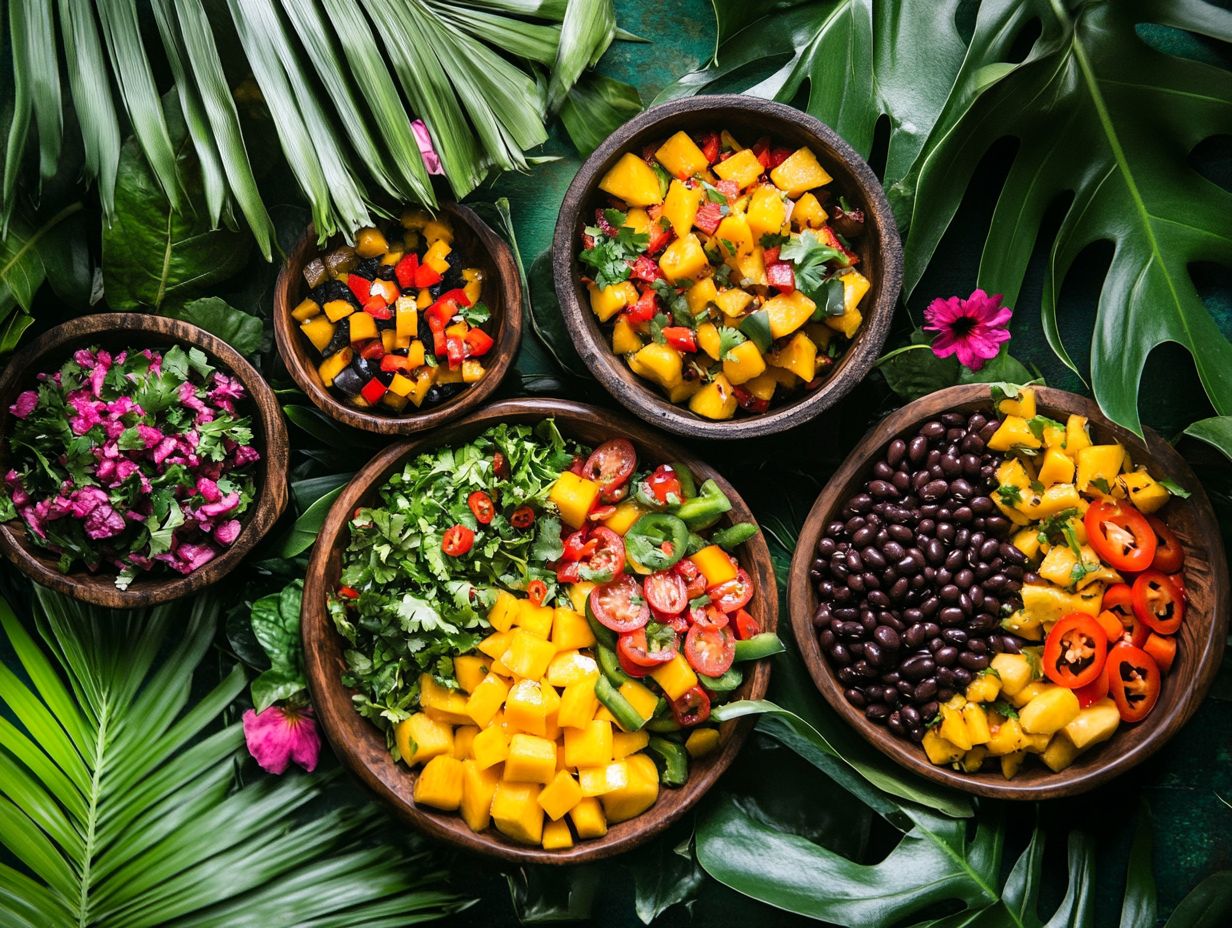 Key ingredients in Caribbean vegan cooking include staples, spices, proteins, and fats that enhance the flavor of dishes while allowing traditional Caribbean meals to be adapted for vegan diets, appealing to a wide range of palates. Popular ingredients include chickpeas, coconut rice, and plantains, which are featured in dishes like the Caribbean Bowl. Chickpeas are a staple in many Caribbean dishes and serve as an excellent source of protein and fiber. They can be incorporated into soups and stews or served as a side dish to complete a meal, providing a satisfying and hearty option. Sweet potatoes are another essential ingredient in Caribbean cuisine. Rich in carbohydrates, vitamins, and minerals, they make a fantastic substitute for meat in many traditional recipes, contributing to a creamy and comforting culinary experience. Coconut rice is a beloved Caribbean staple that provides a creamy base for numerous dishes. Its rich texture and flavor complement a variety of proteins and vegetables. Spices and herbs such as thyme, cumin, and garlic play a crucial role in Caribbean cooking. These ingredients can be easily integrated into vegan dishes, serving as the foundation for developing unique flavors that transform traditional meals into delicious and satisfying vegan options, including popular dishes like paella with a socarrat crust.
Key ingredients in Caribbean vegan cooking include staples, spices, proteins, and fats that enhance the flavor of dishes while allowing traditional Caribbean meals to be adapted for vegan diets, appealing to a wide range of palates. Popular ingredients include chickpeas, coconut rice, and plantains, which are featured in dishes like the Caribbean Bowl. Chickpeas are a staple in many Caribbean dishes and serve as an excellent source of protein and fiber. They can be incorporated into soups and stews or served as a side dish to complete a meal, providing a satisfying and hearty option. Sweet potatoes are another essential ingredient in Caribbean cuisine. Rich in carbohydrates, vitamins, and minerals, they make a fantastic substitute for meat in many traditional recipes, contributing to a creamy and comforting culinary experience. Coconut rice is a beloved Caribbean staple that provides a creamy base for numerous dishes. Its rich texture and flavor complement a variety of proteins and vegetables. Spices and herbs such as thyme, cumin, and garlic play a crucial role in Caribbean cooking. These ingredients can be easily integrated into vegan dishes, serving as the foundation for developing unique flavors that transform traditional meals into delicious and satisfying vegan options, including popular dishes like paella with a socarrat crust.
Common Spices and Produce Used
Common spices and produce used in Caribbean vegan cooking, such as saffron and coriander, are essential for creating the characteristic flavors of the region’s cuisine, as well as offering numerous health benefits. For instance, cumin is incorporated into Caribbean dishes for its digestive properties, while turmeric is prized for its anti-inflammatory benefits both of which are significant in plant-based diets. The inclusion of fresh produce, such as Caribbean sweet potatoes, and herbs like rosemary, not only adds vitamins and minerals but also contributes a natural sweetness that balances the savory elements of many dishes. Naturally fragrant herbs like rosemary and cilantro can elevate a simple meal, showcasing how traditional ingredients make Caribbean meals both delicious and health-focused when prepared in a vegan style. A great example of this is a vibrant Caribbean Bowl that combines chickpeas, plantains, and coconut rice.
Popular Vegan Caribbean Recipes
Popular vegan Caribbean recipes harness the rich flavors and comforting qualities of Caribbean cuisine while providing plant-based alternatives, featuring ingredients like black eyed peas and scotch bonnet peppers. Dishes such as jerk tofu and vegetable skewers demonstrate how spices like curry powder and turmeric can be used to create bold flavors. Coconut rice and beans serve as a creamy, comforting side that complements any meal, providing a wholesome option for dinner or lunch. Plantain and black bean stew is a delightful way to savor a hearty and nutritious dish that captures the essence of Caribbean comfort food, allowing you to enjoy the region’s distinct flavors without compromising dietary restrictions.
Jerk Tofu and Vegetable Skewers
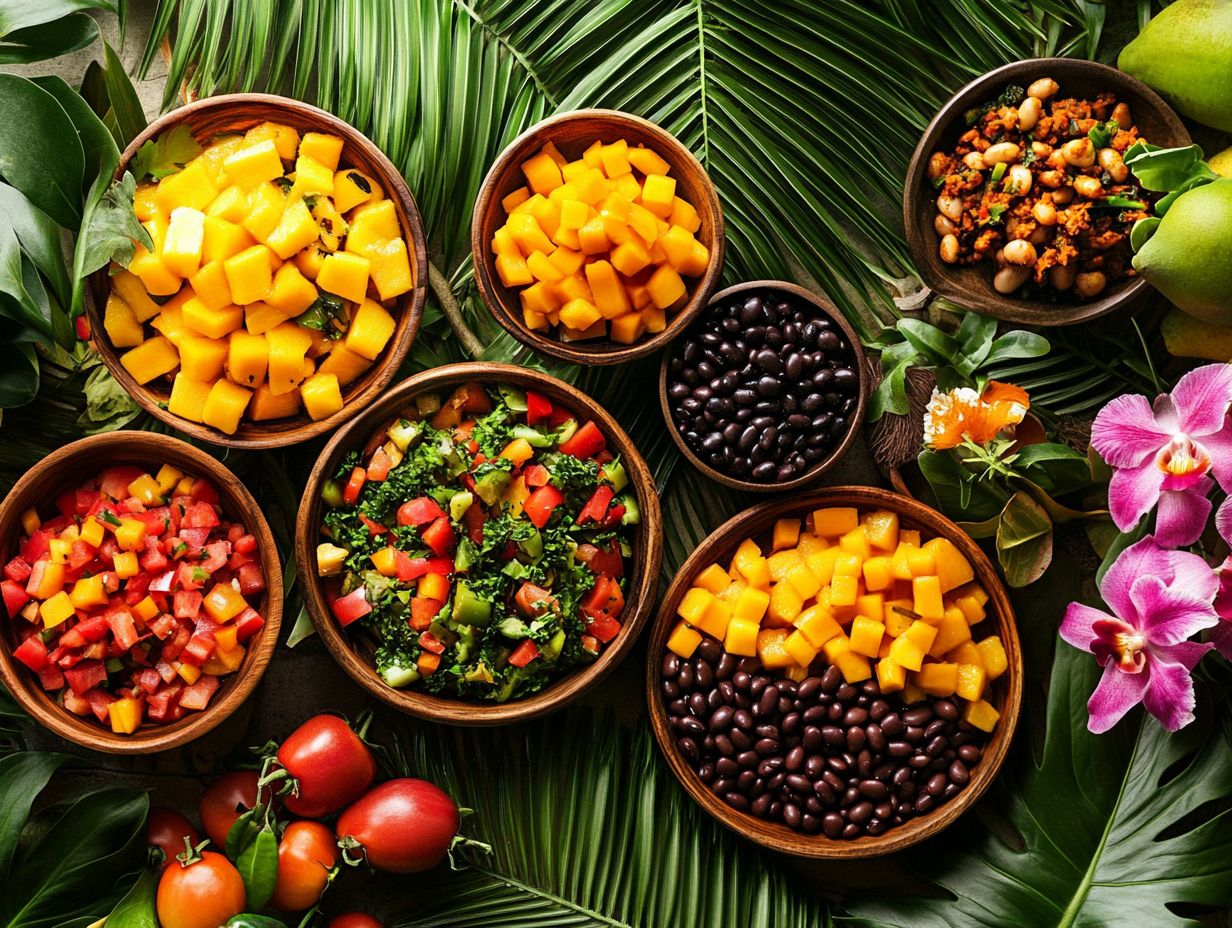 Jerk tofu and vegetable skewers are a vibrant Caribbean dish that features a variety of colorful vegetables and a spicy sauce while remaining entirely plant-based. The tofu is marinated in a blend of jerk spices, including cumin, paprika, and thyme, along with aromatic garlic, onion, and fresh lime, and then grilled alongside an assortment of colorful vegetables. This dish is both satisfying and flavorful, showcasing how traditional jerk seasoning can be adapted to create bold vegan recipes that everyone can enjoy. To prepare the skewers, it is essential to press the tofu to remove excess moisture, allowing it to better absorb the marinade. The marinade can be enhanced by blending fresh scotch bonnet peppers, ginger, and allspice with a splash of soy sauce and lime juice. After marinating the tofu for at least an hour, cut it into cubes and thread it onto skewers with bell peppers, zucchini, and red onions. Grilling the skewers over medium heat caramelizes the natural sugars in the vegetables, imparting a delightful smokiness to the dish. This process creates a harmonious balance of spice, sweetness, and zest in every bite.
Jerk tofu and vegetable skewers are a vibrant Caribbean dish that features a variety of colorful vegetables and a spicy sauce while remaining entirely plant-based. The tofu is marinated in a blend of jerk spices, including cumin, paprika, and thyme, along with aromatic garlic, onion, and fresh lime, and then grilled alongside an assortment of colorful vegetables. This dish is both satisfying and flavorful, showcasing how traditional jerk seasoning can be adapted to create bold vegan recipes that everyone can enjoy. To prepare the skewers, it is essential to press the tofu to remove excess moisture, allowing it to better absorb the marinade. The marinade can be enhanced by blending fresh scotch bonnet peppers, ginger, and allspice with a splash of soy sauce and lime juice. After marinating the tofu for at least an hour, cut it into cubes and thread it onto skewers with bell peppers, zucchini, and red onions. Grilling the skewers over medium heat caramelizes the natural sugars in the vegetables, imparting a delightful smokiness to the dish. This process creates a harmonious balance of spice, sweetness, and zest in every bite.
Coconut Rice and Beans
Coconut rice and beans is a classic Caribbean dish that highlights the comforting qualities of the region’s cuisine. This creamy and filling side complements any meal and is both flavorful and healthy, making it a popular choice for families and gatherings. The standard ratio is one part rice to one part beans, cooked with two parts coconut milk and water to achieve the desired creaminess. Some variations include bell peppers or diced cilantro for a touch of freshness. The addition of garlic and onion enhances the dish’s fragrant nature, while its creamy texture evokes fond memories of comfort food for many. Coconut rice and beans pairs well with grilled meats but can also be enjoyed on its own.
Plantain and Black Bean Stew
Plantain and black bean stew is a hearty and nourishing dish that highlights the sweet flavor of ripe plantains and the richness of black beans. Enhanced with coconut milk and spices such as cumin and thyme, this Caribbean comfort food is both simple and incredibly delicious. The combination of flavors and textures makes it an excellent choice for a cozy dinner or a gathering with family and friends, showcasing the remarkable versatility of plant-based cooking. To prepare the Plantain and Black Bean Stew, start by saut ing onions and garlic in olive oil. Next, add diced ripe plantains and black beans (you can use canned beans or cook dried beans from scratch). Pour in the coconut milk and season the mixture with spices such as cumin, smoked paprika, curry powder, and salt. Allow it to simmer for 15 minutes, stirring occasionally, and serve it hot for a satisfying dinner.
Tips for Adding Bold and Spicy Flavors
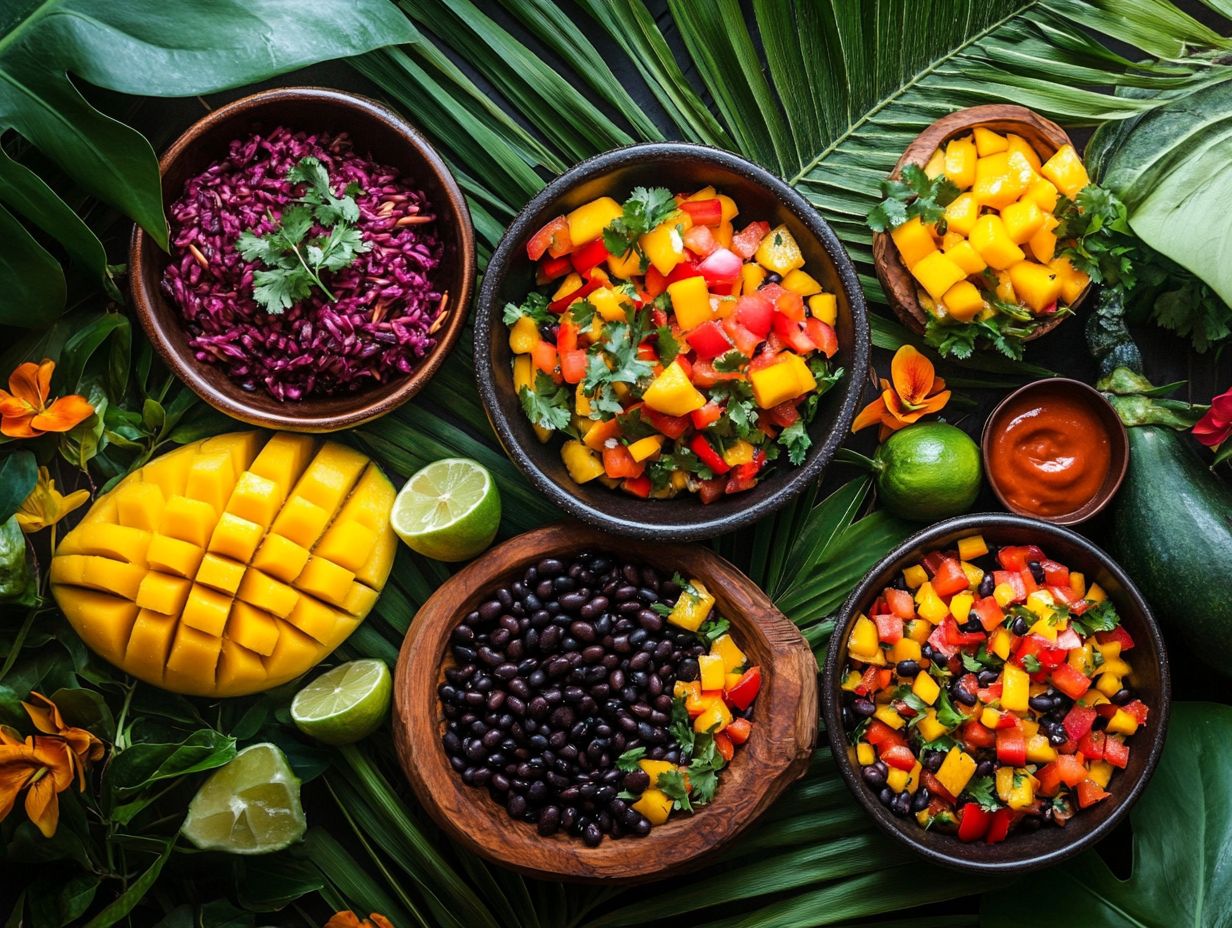 The essence of Caribbean vegan dishes lies in their bold and spicy flavors, which are essential to achieving the same vibrancy as traditional meals. Ingredients like scotch bonnet peppers and herbs like thyme and coriander are indispensable in this regard. Herbs and spices such as curry powder, thyme, and scotch bonnet peppers significantly enhance the flavor of any recipe. Additionally, aromatic ingredients like garlic and onion contribute depth while balancing the heat from spicier components, ensuring that every meal is both delicious and pleasing to the senses. Try adding roasted plantains or sweet potatoes to create a satisfying Caribbean meal. By following these tips, you can easily incorporate flavorful Caribbean-inspired cooking into simple plant-based ingredients, such as chickpeas and black-eyed peas, which are staples in many traditional recipes.
The essence of Caribbean vegan dishes lies in their bold and spicy flavors, which are essential to achieving the same vibrancy as traditional meals. Ingredients like scotch bonnet peppers and herbs like thyme and coriander are indispensable in this regard. Herbs and spices such as curry powder, thyme, and scotch bonnet peppers significantly enhance the flavor of any recipe. Additionally, aromatic ingredients like garlic and onion contribute depth while balancing the heat from spicier components, ensuring that every meal is both delicious and pleasing to the senses. Try adding roasted plantains or sweet potatoes to create a satisfying Caribbean meal. By following these tips, you can easily incorporate flavorful Caribbean-inspired cooking into simple plant-based ingredients, such as chickpeas and black-eyed peas, which are staples in many traditional recipes.
Incorporating Heat and Flavorful Spices in Caribbean Cooking
Heat and flavorful spices are essential components of Caribbean cuisine, creating a distinctive regional style that balances richness and spice in every meal. Scotch bonnet peppers, renowned for their intensely spicy flavor, are commonly used in many Caribbean recipes, such as Jamaican mango stew or a Trinidadian green beans saut , with the heat level adjustable to suit individual preferences. Spices such as cumin, turmeric, and curry powder not only add spice but also contribute depth and complexity to flavors, resulting in comforting and satisfying dishes that embody the essence of Caribbean cooking. Consider adding coriander and fresh lime to brighten up your dishes. When preparing these dishes, it is important to master the control of heat levels. For instance, removing the seeds and membranes from Scotch bonnet peppers can significantly reduce their heat while still preserving their characteristic flavor. Similarly, incorporating milder spices like smoked paprika can enhance a dish’s flavor profile without overwhelming the palate. Additionally, using coconut milk in recipes not only adds creaminess but also acts as a cooling agent that balances the heat, making the dish more appealing to those who prefer milder spices. Pairing coconut rice with your dishes can further enhance the creamy texture. This harmonious combination of techniques ensures that every bite reflects the vibrant spirit of Caribbean culinary traditions.
How to Make Vegan Versions of Traditional Caribbean Dishes: From Stew to Paella
Vegan Caribbean cuisine replaces meat in traditional dishes with healthy alternatives such as chickpeas or soy protein, while incorporating coconut milk to achieve creaminess and texture. This approach ensures that Caribbean comfort food remains satisfying while maintaining the plant-based essence of traditional recipes. The use of a diverse array of spices and herbs allows for the preservation of authentic Caribbean flavors in vegan dishes, making them both delicious and a healthier alternative to their traditional counterparts.
Adapting Meat-Based Dishes to Vegan Ingredients
Adapting meat-based dishes to incorporate vegan ingredients allows for the preservation of beloved Caribbean flavors while promoting a healthier lifestyle. Creating a Caribbean Bowl with kidney beans, green beans, and roasted plantains can be a delicious and vegan-friendly option. By replacing animal proteins with nutrient-dense options such as chickpeas or lentils and using coconut milk for creaminess, traditional recipes can be transformed into delicious vegan meals without sacrificing taste. The right spices and herbs not only enhance the flavor but also ensure that the essence of classic Caribbean comfort food remains intact, making these adaptations both enjoyable and satisfying. For instance, mushrooms can be utilized as a hearty substitute in stews, as their texture mimics meat and allows them to soak up aromatic seasonings. For those craving pulled ‘pork,’ jackfruit serves as an excellent alternative, offering a similar fibrous quality and the ability to absorb rich sauces. You can also try making a vegan paella using saffron, vegetable broth, and achieving a perfect socarrat for added texture. It is also crucial to consider traditional cooking methods; simmering and slow-cooking techniques can deepen flavors, allowing plant-based ingredients to shine and creating a deeply satisfying meal. With careful consideration of ingredient choices, one can aim to replicate the authentic flavor profiles that define Caribbean cuisine, ensuring that everyone can enjoy these vibrant dishes, regardless of dietary preferences.
